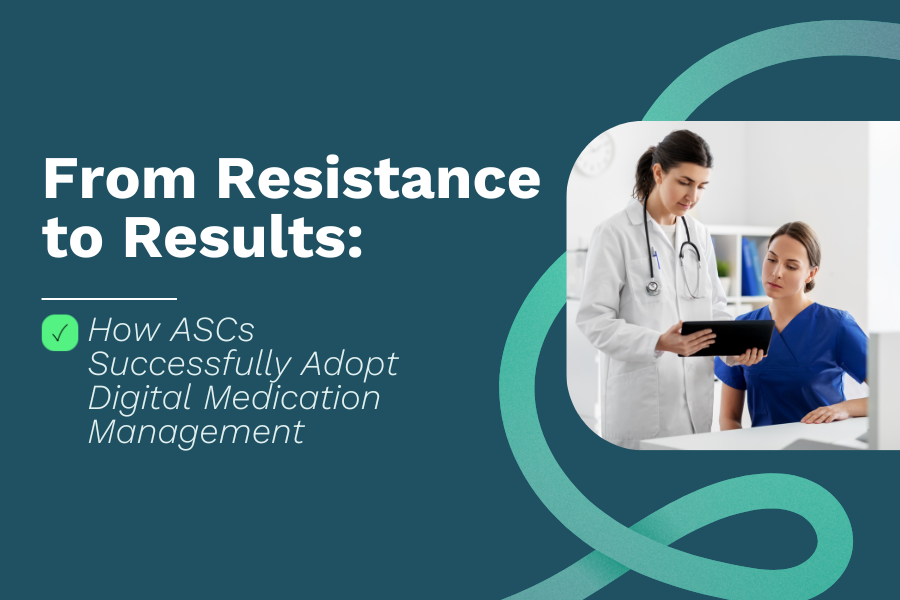From Resistance to Results: How ASCs Successfully Adopt Digital Medication Management
Ambulatory Surgery Centers (ASCs) face unique challenges when it comes to medication management. Unlike hospitals with extensive pharmacy departments, ASCs must streamline their processes while maintaining the highest safety standards. MedServe’s digital medication management system offers a solution tailored specifically for outpatient settings. But successful adoption requires thoughtful planning, leadership support, and implementation designed around each facility’s workflow.
Understanding the ASC Medication Challenge
ASCs operate in a fast-paced environment where medication errors can have serious consequences. Traditional paper-based systems and manual processes create opportunities for mistakes, from transcription errors to missed allergy alerts. With patient turnover measured in hours rather than days, every step in the medication process must be both efficient and accurate.
The complexity increases when you consider that ASCs handle a wide variety of medications—from pre-operative anxiolytics to post-surgical pain management—all while coordinating with multiple healthcare providers and managing inventory efficiently.
Key Components of Digital Success
Start with Leadership Buy-In
Successful digital adoption begins at the top. ASC administrators and medical directors must champion the change, understanding that initial investment in technology and training will yield long-term benefits in safety, efficiency, and compliance. When leadership demonstrates commitment, staff are more likely to embrace new processes.
Choose the Right Technology Partner
Not all medication management systems are designed for the ASC environment. MedServe understands ASC workflows, offering a smart narcotic cabinet and digital platform that integrates with your EHR system and supports your compliance requirements.
Focus on User Experience
Healthcare workers are more likely to adopt technology that makes their jobs easier, not harder. MedServe’s system features an intuitive interface designed to streamline key workflows—from medication access to real-time documentation.
Implementation Best Practices
Phase Your Rollout
Rather than switching everything at once, successful ASCs typically implement digital medication management in phases. Start with one area—perhaps pre-operative medication reconciliation—and master that before expanding. This allows staff to build confidence and resolve issues early.
Invest in Comprehensive Training
Technology is only as good as the people using it. MedServe provides personalized onboarding and training based on role and workflow. Super users are empowered to support peers and troubleshoot on-site.
Customize for Your Workflow
MedServe works with each facility to tailor the system to your procedures, patient needs, and documentation practices. From alert thresholds to medication kits, customization ensures the platform fits naturally into your existing operations.
Overcoming Common Obstacles
Staff Resistance to Change
Change can be intimidating, especially for experienced healthcare workers used to established routines. Involve clinical teams early in the process. When their feedback shapes implementation, adoption rates improve.
Technical Integration Challenges
ASCs often use multiple software systems—scheduling, EHR, inventory, billing. MedServe’s platform is designed to integrate with your existing tech stack, ensuring smooth data flow and minimizing disruption.
Budget Constraints
Digital systems require upfront investment, but the ROI comes through increased efficiency, fewer medication errors, and stronger compliance. MedServe helps ASCs build the business case by quantifying the cost of inefficiencies and demonstrating clear value.
Measuring Success
Track Key Performance Indicators
Before and after implementation, track metrics like medication error rates, staff time spent on medication-related tasks, inventory accuracy, and compliance findings. MedServe’s analytics dashboard makes it easy to monitor performance in real time.
Patient Safety Outcomes
Digital systems should reduce medication errors, improve allergy checking, and enhance medication reconciliation accuracy. With MedServe, clinical directors gain confidence knowing every transaction is logged and traceable.
Operational Efficiency
MedServe helps reduce administrative burden, streamline end-of-day counts, and cut down on emergency med orders. These time savings free up staff for patient care and improve case throughput.
Building a Culture of Continuous Improvement
Foster Open Communication
Create channels for staff to report issues, share ideas, and celebrate wins. MedServe’s customer support team remains a partner beyond go-live, ensuring ongoing optimization.
Stay Current with Best Practices
The healthcare technology landscape evolves quickly. MedServe keeps your facility informed of new features, compliance updates, and implementation tips to maintain best-in-class performance.
The Path Forward
Digital medication management represents a major opportunity for ASCs to improve patient safety while increasing efficiency and compliance. MedServe’s implementation approach—focused on collaboration, customization, and support—helps ASCs successfully transition to digital systems.
By focusing on leadership, training, and phased adoption, your facility can realize long-term value. The investment in digital medication management pays dividends through safer care, happier staff, and stronger compliance outcomes.
Ready to see how MedServe can support your digital adoption?
Schedule a call to connect with our team and explore what a tailored implementation could look like for your ASC.

